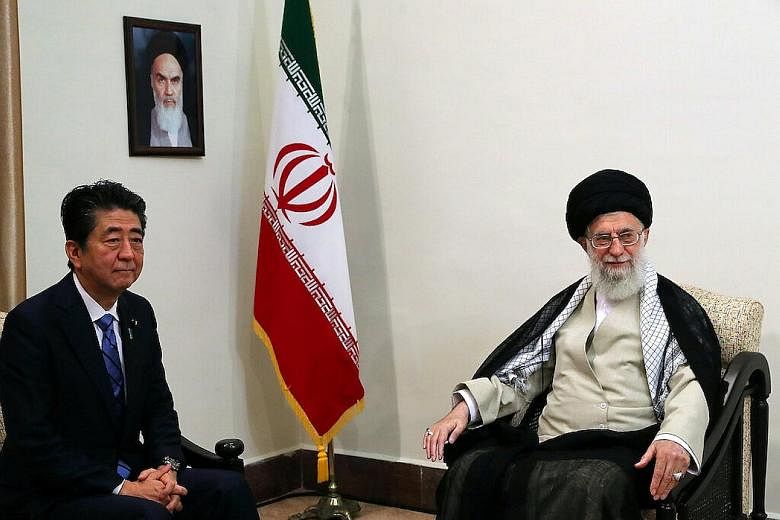LONDON • Iran's supreme leader Ali Khamenei told Japanese Prime Minister Shinzo Abe yesterday there was no point even replying to a message Mr Abe had brought to Teheran from US President Donald Trump, as a peacemaking visit was overshadowed by attacks on tankers in the Gulf of Oman.
The attacks on the two tankers - one of which was Japanese - were the latest incident to escalate confrontation between the US and Iran after weeks of tightening US sanctions and a war of words.
Japan was one of the main buyers of Iranian oil until last month, when Washington ordered all countries to halt all Iranian oil imports or face sanctions of their own.
Mr Abe, who had discussed Iran with Mr Trump last month, brought a message from the US President, but Mr Khamenei rebuffed it.
"I do not see Trump as worthy of any message exchange, and I do not have any reply for him, now or in future," Iranian state media quoted Mr Khamenei as telling the Japanese Premier.
US allies in Europe and Asia have repeatedly expressed concern that tension between the US and Iran could escalate into an armed conflict. Mr Abe warned on Wednesday of unintended clashes in the Middle East, after meeting Iranian President Hassan Rouhani.
A year after the US abandoned a deal between Iran and world powers to curb Teheran's nuclear programme in return for lifting sanctions, confrontation between the two foes has reached a new pitch.
Washington has dispatched additional forces to the region in recent weeks after accusing Teheran of threatening shipping there.
Iran has denied being behind attacks on ships and suggested they could be intended as a provocation.
Yesterday's attacks on "Japan-related" tankers were suspicious, especially on the day Mr Khamenei and Mr Abe met, Iranian Foreign Minister Mohammad Javad Zarif tweeted.
The Trump administration says the deal it quit last year, which was negotiated by Mr Trump's predecessor Barack Obama, was not firm enough. Iran says it cannot negotiate with a country that had abandoned the agreement.
Washington's allies say they share its concerns about some Iranian behaviour but believe exiting the agreement was a mistake as it makes further negotiations harder.
Ultimate authority in Iran is wielded by Mr Khamenei, a hardline cleric in power since 1989, although the country is run day-to-day by Mr Rouhani, the pragmatist President who won two landslide elections on promises to open Iran to the world.
Mr Khamenei said a recent promise by Mr Trump not to seek regime change in Iran was "a lie".
"The Islamic Republic of Iran has no trust in America and will never repeat the bitter experience of previous negotiations with America in the framework of the JCPOA," Mr Khamenei said, referring to the Joint Comprehensive Plan of Action, known as the Iran deal. "No wise and proud nation will accept negotiations under pressure."
Mr Abe told reporters that Mr Khamenei had promised Iran had no intention of pursuing nuclear weapons. "Supreme Leader Khamenei made a comment that the country will not and should not make, hold or use nuclear weapons, and that it has no such intentions," Mr Abe said.
Iran has always maintained its nuclear programme is peaceful.
REUTERS

